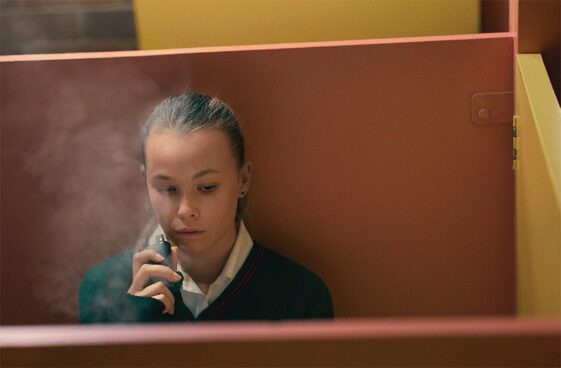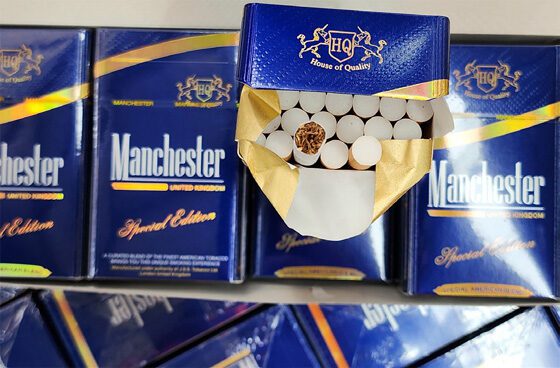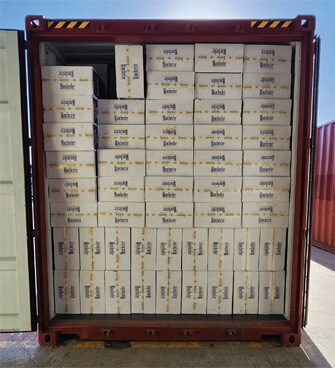Tobacco tax rises and vape crackdowns have boosted the black market to Prohibition proportions. So will new regulations be enough to calm and control this beleaguered industry? Catherine Lewis reports.
Twenty years ago, a single cigarette cost $0.23. Extreme tax hikes and a recent crackdown on vapes – said to contain as much tobacco as 50 cigarettes – and that same stick now costs $1.48, with taxes accounting for 65%, says the Australian Taxation Authority. Little wonder there is a booming black market for illegal tobacco grown, manufactured or imported without duties or taxes. Paying a third of the price for a packet is hard to quit. But the days of dark alley dealings in the dodgy end of town are done. Instead illegal tobacco is hidden behind tills in the brightly lit corner shops of affluent suburbs.
Over the first half of this year, NSW Health inspectors seized 90,000 vapes and six million illegal cigarettes, totalling more than $7 million – the ash from an increasingly violent tobacco war. Ramraids are now commonplace. Twice, in the case of Lane Cove’s TSG tobacconist on Longueville Road, and 14 arson attacks in NSW, as criminal gangs torch shops and fight over turf. Sure, smoking rates have halved since 2001, but that’s based on legal sales, not the almost 40% of tobacco consumption across the country that was illegal in 2024, up 28.6% from the year prior, says FTI Consulting’s Illicit Tobacco in Australia report. Hitting Federal Government coffers to the tune of $6.7 billion last year and sparking community chaos, calls for control are growing frantic.
Stringent rulings on vapes – pharmacy purchase only, with a prescription if under 18 – have pushed up to 90% of sales underground, says Llewellyn Consulting’s Tobacco and vaping products in Australia. While research body Roy Morgan’s consumer survey found that if tobacco taxes were hiked higher, 14% of current legal smokers would turn to illicit tobacco; ditto 9% of vapers. Roy Morgan chief executive officer, Michele Levine, argues that the 2024 crackdown has ‘demonstrably failed to reduce overall rates of smoking and vaping,’ with the number of 18 to 24-year-olds – the most prolific group – rising from 25 to 28%.
“Rates of smoking have increased since legislation was introduced in mid-2024 – driven almost entirely by younger Australians aged 18 to 24,” she says. “In particular, in the year to September 2024, over one-sixth of Australians were smoking or vaping. And after briefly dipping, the latest data shows the overall rate of smoking and vaping has now returned to the same level and the raw number is now higher.”


Illicit cigarettes seized at the Australian border by the Multi-Agency Strike Team (MAST) n July 2025
This is in stark contrast to the Cancer Council’s Generation Vape study, which found that vaping in the 14 to 17 age bracket fell from 18% in 2023 to 15% this year.
Locally, communities are ablaze at the sheer number of tobacco stores smoking out our streets. NSW Health reports 25% growth across the state – now more than 19,500 – with reports showing that, for every McDonald’s restaurant, there are 60 tobacco shops, with many strategically placed to tempt youth on the school run, or close to beachfronts and eateries. “Enough is enough,” Willoughby MP Tim James tells North Shore Living of the ‘at least 22 local retailers’ that have been selling illegal tobacco products, with enforcement ‘virtually non-existent.’
“Over the past few years, we’ve seen a dramatic rise in tobacconists operating with impunity in the heart of our suburbs, including some right near schools, selling candy-flavoured vapes and illicit products,” Mr James says. ”It’s completely out of control. These aren’t harmless shopfronts. They are often criminal fronts for an illegal trade now worth $5 billion a year.
“NSW currently has the weakest tobacco laws on the east coast. That’s why criminals are flocking here.”
North Sydney Council has updated its existing Smoke-Free Environment – Declared Public Areas Policy to include vapes, with Mayor Zoë Baker telling NL: “North Sydney has 21 schools within just 10.5km2, and the presence of tobacconists near these schools is putting children at risk.
“Despite laws banning vape sales to minors, young people are still accessing these products. Council has called on state and federal governments to introduce exclusion zones around schools and playgrounds.
“Without location-based restrictions, there is a critical gap in our protections for the health and wellbeing of our young people. Council will continue to advocate for change and work with local schools and parents to push for legislative reform,” Mayor Baker concludes.
North Shore MP Felicity Wilson agrees, saying that within 300 metres of her electorate office, which is just across the road from a public school, there are now five tobacconists. “The lack of regulation of these stores makes them a magnet for illicit activity,” Ms Wilson says.
To temper concerns, the State Government has rolled out a raft of measures, starting with the appointment of an illicit tobacco and e-cigarette commissioner to lead a ‘comprehensive approach to this growing threat.’ The new tobacco licensing scheme will require all retailers and wholesalers of tobacco and vapes to obtain and display a license by 1 October, alongside a criminal records check and yearly fee. A joint whole-of-government tobacco taskforce will coordinate findings from a NSW parliamentary inquiry, examining tobacco’s links to organised crime and money laundering, the social and economic impacts on local communities and businesses, and compliance and enforcement regimes.

Containers from the July MAST seizure were alleged to contain 46 million illicit cigarettes worth approximately $31 million
Health Minister Ryan Park describes the reforms as the ‘toughest in the country.’
Chair of the inquiry committee, Robert Borsak, says the impact of the black-market tobacco trade on communities is reaching crisis point: “Small businesses have reported instances of violence, intimidation and financial insecurity and there have been reports of harmful substances detected in illicit tobacco products including fungal and mould spores.
“Increasing excise duties, while intended to reduce consumption and generate revenue, may not be having the desired effect,” he says.
Mr Borsak adds a ‘detailed evidence-based understanding of what is happening on the ground,’ is needed to determine ‘whether the legislative framework and enforcement regime is adequate to address this growing problem.’
New maximum penalties of $1.5 million and up to seven years’ imprisonment for the sale of commercial levels of illegal tobacco, alongside fines for retailers of up to $880,000 and $660,000 for individuals, are being rolled out. NSW Health will be empowered to issue short-term closure orders, with landlords allowed to evict retailers caught selling illegal tobacco under the plans.
“We are disrupting the business model of large-scale criminals who profit from addiction, tax evasion, and putting young people at risk,” says Health Minister Park. “This isn’t just a serious health issue, it’s about fairness, because these illegal operators are undercutting small businesses that are doing the right thing.”
NSW Health has also doubled its number of authorised inspectors from 14 to 28. Public participation is also encouraged – NSW Health’s website invites residents to report illegal sales they see taking place in their local area, from shops bypassing packaging rules, to under the counter vapes.
But despite Minister Park deeming vaping the ‘biggest public health crisis young people face at the moment,’ and despite the Australian Institute of Health and Welfare deeming smoking the leading cause of preventable death in Australia each year, nicotine retains its powerful grip. Hiking taxes to such extremes has set in motion a fall-out of Prohibition proportions, bolstering black markets and sucking in young people. Locally, Willoughby MP Tim James feels the focus should be on stubbing out the brazen breeding of such stores: “We need real enforcement, real deterrents, and a government with the backbone to act. Our communities deserve nothing less.”
If you need support to quit smoking or vaping, call the free NSW Quitline: 13 78 48.








